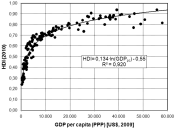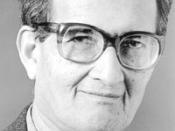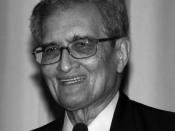Sen and Sensibility
A Look at the Welfare Economics of Amartya Sen
Whatever we understand and enjoy in human products instantly becomes ours. Wherever they might have their origin; Let me feel with unalloyed gladness that all the great glories of man are mine. Rabindranath Tagore
This paper offers a brief history of Nobel prize winning economist Amartya K. Sen and his work; reviews some of the groundbreaking work in the area of welfare economics that inspired Sen; and provides a brief analysis of the issues discussed.
Introduction
Economist Amartya K. Sen of India received the 1998 Nobel Prize in economics for his contributions to welfare economics. Born in 1933, Sen studied in Calcutta and Cambridge (where he received his PhD) and has held teaching positions at Oxford, London, Delhi, Calcutta, Harvard, Berkeley, Stanford, MIT, and Cambridge. He holds honorary doctorates from more than 25 schools and universities. Sen became the first non-American president of the American Economic Association and the first non-British master of Trinity College, Cambridge.
In his youth Sen witnessed the Bengal famine of 1943, which killed 2-3 million people, and the race riots of the 1940s. This led him to conclude "economic unfreedom, in the form of extreme poverty, can make a person a helpless prey in the violation of other kinds of freedom." It was because of these conditions in India that Sen pursued a career in economics.
Ethics and Economics
In his book, On Ethics and Economics, Sen points out the unrealistic stance of modern economics in its attempt to separate economics from ethics. His objection is two-fold. First that economics is a social science that attempts to account for real people. Given this, Sen argues that "it is hard to believe that real people could be completely unaffected by the reach of the...


